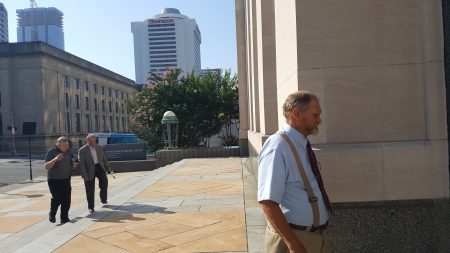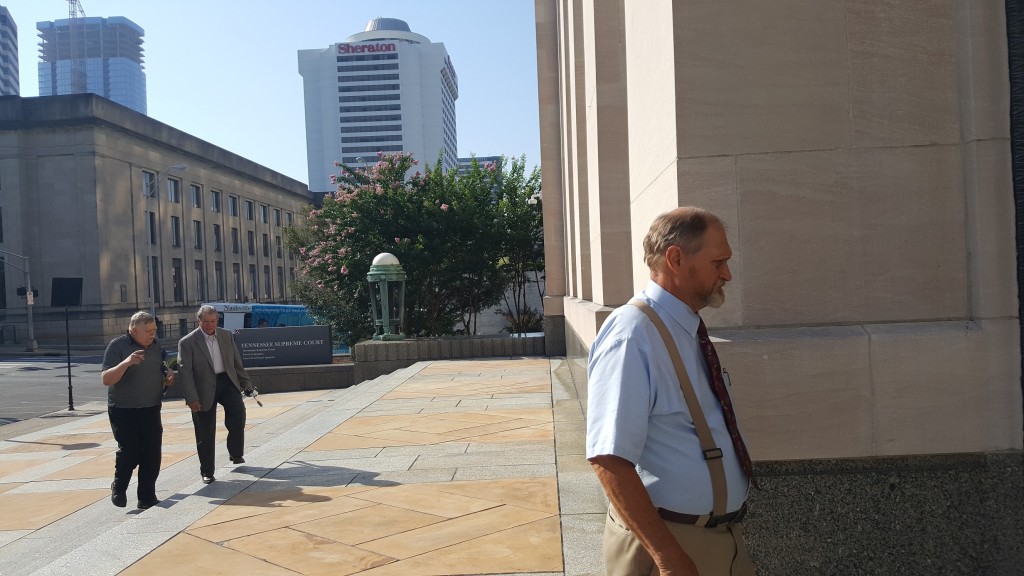A DEFENSE OF “THE PEOPLE’S LIBERTIES”
by David Tulis / Noogaradio 1240 AM 92.7 FM

(Jul. 20, 2017) — NASHVILLE, July 18, 2017 — A criminal court of appeals today hears arguments from a 65-year-old laborer in Middle Tennessee who says that the gun statute is unconstitutional because it is vague and that traffic enforcement statewide is outside statutory authority.
In oral arguments made without the benefit of counsel, a well-researched Arthur Jay Hirsch, who has fought for constitutional rights much of his life, says the three judge panel has two options in dealing with state control over the roadways.
“I argue that the Tennessee vehicle code is constitutional if any unalienable right to private travel is recognized — as it was before 1936,” he says. “I argue that the vehicle code is unconstitutional if it abrogates the people’s unalienable right to travel freely on the public highways.”
“The indictment is invalid due to the misapplication of the vehicle code,” Mr. Hirsch insists. “It presumes I was engaged in commercial activity and subject to the privilege statutes rather than traveling by right in my constitutional status of private capacity. Therefore this case should be dismissed.”
The judges let Mr. Hirsch speak of his “unfair and unjust” trial without interruption. He is so succinct the appellant does not use his allotted 20 minutes.
The arguments made by Gov. Bill Haslam’s attorney general’s office, through staff lawyer Todd Ridley, are not in the realm of ideas or state authority or defending the clarity or scope of statutes. Rather, the spinnings of the state executive branch are technical and procedural, a miscellany of this and thats.
Gov. Haslam holds that Mr. Hirsch had not given fair warning of all his objections, had not motioned for a new trial and was properly convicted in a court that had jurisdiction.
Mr. Ridley’s effort trips over a noisy factual error in his brief about date and trial location of which he and the judges make much fuss.
Gun ban gets no defense
Mr. Hirsch says the gun statute fatally has no definitions of key words. “The jurors were left to guess and speculate at the meaning” of the law, Mr. Hirsch says. “A person commits an offense who carries with the intent to go armed a firearm or a club,” reads the law (TCA 39-17-1307). Mr. Hirsch sees traps for the innocent in the law shaped to disarm blacks prior to the war to prevent Southern independence and reshaped to make them defenseless after emancipation.
“There are no definitions for this passage for ‘carry’, ‘carries,’ or ‘with the intent to go armed,’” he declares. “Therefore, it is void for vagueness.”
The U.S. Supreme Court has held that in the absence of clear definition of words and phrases in a statute, it is considered void for vagueness, a violation of due process of the 14th Amendment and is therefore unconstitutional, Mr. Hirsch says.
The vagueness doctrine in U.S. v. Ragwell forbids courts to “impose punishment on actions that are not plainly and unmistakably proscribed,” Mr. Hirsch says, and Black’s law dictionary holds that “the vagueness doctrine under this principle is a law that ‘does not fairly inform a person of what is commanded or prohibited is unconstitutional as violative of due process.’”
Due process requires the striking down of vague laws. Because the law is fuzzy, Mr. Hirsch says, the trial court lacked authority to convict him under it and his conviction is void.
Mr. Ridley lawyerly murk contrasts Mr. Hirsch’s plainspokenness on the people’s liberties and their defense. “The vast majority of claims he has made are sub-issues within sub-issues” and he warns “of a bleeding together of legal issues and jurisdictional issues” to the sum that Mr. Hirsch “waived” any challenge to the gun law because it wasn’t clear at trial whether he was challenging the gun law “facially” or “as applied.”
The reported crime occurred in Lawrence County, he says, was tried in Lawrence County and led to a conviction in Lawrence County. Therefore, Mr. Ridley says, circuit court had jurisdiction and Mr. Hirsch’s arguments about misapplication of the driving statute are wrong.
Mr. Ridley says guns are within the general assembly’s authority to regulate. To keep alive his theory that Mr. Hirsch cannot challenge the gun law on appeal, Mr. Ridley, even in the alternative, does not defend the law as clear because Mr. Hirsch “simply did not raise” constitutional arguments at trial.
Travel (liberty) v. transportation (privilege)
Three of his four convictions were won, Mr. Hirsch says, when the state misapplied commercial statutes to his lawful and innocent activity on the public roadway. Here Mr. Hirsch argues for the exercise of basic human rights and attacks commercial government as extra-constitutional and rent-seeking. His presentation wrenches away the pall of progressive statism and pours light on the pulsing might of liberty and private free enterprise.
“There is no record or evidence that I was engaged in regulated commercial activity, that is transporting people or goods for hire on the public Highway by motor vehicle. The 1936 motor vehicle code was named Uniform Motor Vehicle Operator and Chauffeur’s License Act, completely commercial in nature, and the title indicates that it is commercial. It is directed at those engaged and commercial activity, that is, transporting people or goods by motor vehicle for hire on the public highways.

“The Tennessee Motor Vehicle Code deals with taxable privileges granted by voluntary application for a fee. On the other hand, people in their private capacity have an inherent, unalienable and God-given right of liberty at birth which of necessity allows them to travel freely on the public highway in their own private conveyance in the ordinary course of life and business without regulation.
“I argue that the vehicle code of 1936 did not disturb the people’s unalienable right to private travel. It only affected commercial transportation by motor vehicle for hire. The term ‘rights’ does not even appear in the code. And all key words and phrases of the vehicle code are defined in commercial terms. The inalienable and God-given right to travel is non-statutory and non-taxable and forever outside the world of commerce and legislation. It is a free and inherent right from birth and is available to everyone.
“Privileges are taxable and discriminatory. One must pay to play by obtaining a license. However this was very profitable for the state, so over time people were led to believe that they are all engaged in commerce and are subject to the taxable privileges statutes and police enforcement.”
Regarding weapons, demands the laborer, does the bill of rights provision for the right to bear arms apply largely and individually? Or is the total gun ban an accurate and lawful rendering of the state constitution’s leave to regulate the “wearing” of arms?
Mr. Hirsch says he was not wearing arms when he was arrested and charged with the gun count. The weapon, a .22-caliber revolver, was in a cooler in the cab of his red pickup truck.
Mr. Hirsch, wearing a blue shirt, a red tie and suspenders, is a clean faced bachelor with a beard who lives off the grid and has attempted to eliminate his corporate personae. He was a county supervisor in Shenandoah County, Va., from 1992 to 1995 where he was hugely popular for raising trouble for government on behalf of taxpayers.
Careless judge, ‘plain error’
Mr. Hirsch’s attack on the police state and Tennessee’s “deep state” operations are thorough and profound. But judges in Tennessee have generally risen to defend state interests as against the rights of the people — in their allowing unconstitutional search and seizures through police roadblocks in the Hicks and Downey opinions, for example.
The most fertile ground for dismissal of the convictions — and avoid having to deal with touchy constitutional problems — will be probably in the plain error part of Mr. Hirsch’s argument. There are several errors that Mr. Hirsch alleges.
Chief among them was Judge Hargrove’s refusal to consider his challenge of jurisdiction. Mr. Hirsch says when a defendant challenges jurisdiction, the state has to prove it. Judge Hargrove proposed at the trial that jurisdictional issues be cleared up, pointlessly, after the trial. Mr. Hirsch says the record shows that he objected to this denial of due process.
This reporter was startled at Judge Hargrove’s careless ways, and produced on Mr. Hirsch’s request an affidavit describing an unethical ex parte chat with the prosecutor while Mr. Hirsch was in the restroom. Her blunders were so many this slip didn’t make the cut in Mr. Hirsch’s appeal.
Judge Hargrove erred in denying his use of the Bible on grounds that he was making “a sermon,” as Mr. Ridley put it. Mr. Hirsch, a devout practicing believer who plays the fiddle and gives words of Christian encouragement in nursing homes and jails, says that as a creature he must worship God and give credit to God for his liberty and freedom. For Judge Hargrove to reject the Bible offhand crippled his defense, he says.
“I was denied the right to know the true nature and cause of my accusations. I was denied the right to call witnesses, representatives of state government who would been able to establish how the alleged crimes injured the state (two district attorneys general involved in the case).
The state’s lawyer says what happened at trial “is not at all clear.” He says at least four times “it’s not clear” or “it’s not really clear” what happened at trial. He says at least twice, “I’m not entirely sure.”
Attack on state’s ‘paper crimes’ industry
Most intriguing among Mr. Hirsch’s claims is his question about the state’s standing to prosecute purported criminals. He says the state in his case is unable to meet three requisite elements for standing, which ordinarily would need to be in the indictment. “There is no exception that I can find that exempt the state from the three elements of standing,” he says.
These are simple enough. The accuser must show that it has suffered an injury, that there is “a causal connection between the injury and the conduct of which the state complains,” and “that it is likely that a favorable decision will redress the injury.”
“Further, there is no evidence of a complaining party in the indictment. The supreme court has said a plaintiff must allege personal injury fairly traceable to the defendant’s alleged unlawful conduct. The elements are also applicable in criminal cases.” To this last point he cites a major ruling, City of Chattanooga vs. Davis.
Without being able to show itself injured by his acts, Mr. Hirsch says the state, which Mr. Hirsch says is “a legal fiction,” has no business prosecuting anyone for what are effectively paper crimes.


STATE OF TENNESSEE,
v.
ARTHUR JAY HIRSCH.
No. M2016-00321-CCA-R3-CD.
Court of Criminal Appeals of Tennessee, at Nashville.
July 18, 2017 Session.
Filed September 28, 2017.
Appeal from the Circuit Court for Lawrence County, No. 32518, Stella Hargrove, Judge.
Tenn. R. App. P. 3; Judgments of the Circuit Court Affirmed.
Arthur Jay Hirsch, Lawrenceburg, Tennessee, pro se.
Herbert H. Slatery III, Attorney General and Reporter; M. Todd Ridley, Assistant Attorney General; Kim Helper, District Attorney General; and Tammy Rettig, Assistant District Attorney General, for the appellee, State of Tennessee.
JAMES CURWOOD WITT, JR., J., delivered the opinion of the court, in which JOHN EVERETT WILLIAMS and TIMOTHY L. EASTER, JJ., joined.
OPINION
JAMES CURWOOD WITT, Jr., J.
The defendant, Arthur Jay Hirsch, appeals his Lawrence County Circuit Court jury convictions of driving on a suspended license, unlawfully carrying a weapon with the intent to go armed, and violating both the vehicle registration and financial responsibility laws, claiming that the statute proscribing the unlawful carrying of a weapon is unconstitutional, that the rulings of the trial court evinced a bias against him and resulted in a violation of due process principles, and that the trial court lacked subject matter jurisdiction. Discerning no error, we affirm.